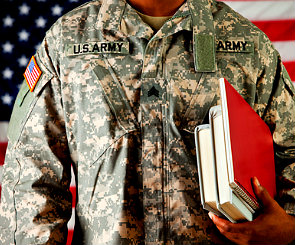Veterans in Higher Education
When it comes to providing effective support services to help veterans achieve academic success, is "military friendly" enough?

When it comes to providing effective support services to help veterans achieve academic success, is "military friendly" enough?

By Tedd "Gunny" Weiser, Office of Veteran Student Services
Last month, I had the pleasure to be part of the team that hosted the second national Military and Veteran Social Work Conference, which took place here at Saint Leo's University Campus.
Being a 20-year veteran myself, it was an extreme pleasure to see so many devout professionals dedicated to helping veterans succeed in higher education. The program of more than 50 speakers and presenters that attracted attendees from around the nation and from several countries was inspiring.
While there was so much to learn from these social work experts, two simple points that came up time and again in presentations and informal discussions really hit home for me. Maybe that's because they represent casual assumptions that I, myself, have been guilty of when working with our veteran students here at Saint Leo – at least until now.
The first point concerns what we assume is meant when an institution calls itself military friendly.
Are we referring to the fact that the university accepts credits awarded by ACE for military training and experience? Do we mean that the university is capable of providing financial assistance through the numerous VA programs, or that classes are offered at a military installation?
Is this the extent of support that you would expect from a true friend? After all, these expectations have become the norm, and there is so much more that can be done to aid our veteran students.
In fiscal year 2013, the VA provided over $12 billion in benefits for veterans' post-secondary education. Since questions were raised about whether some schools were receiving these funds as a result of inappropriate recruiting practices, the U.S. Government Accountability Office conducted a study and published a report titled "VA Should Strengthen Its Efforts to Help Veterans Make Informed Education Choices."
One of the questions the study asked was what types of information student veterans wanted more of as they made their college selection decisions. I found the answer very interesting.
Clearly, the majority of veteran students are greatly concerned about the veteran support services a school has to offer. They desire a support structure as they transition to college campuses. Veteran students are looking for other veterans who can not only talk the talk, but who have walked the walk. This is especially true for those who have served in a combat zone. There is a bond that exists among veterans that is stronger than a normal advisor/student relationship.
While the veteran is the one who has served on active duty, he or she is not alone in the endeavor. There is always someone in the background, and occasionally the forefront, providing the intimate support that they need to carry out their duties.
For quite some time, the majority of us who write about these supporters have referred to them as the "spouse." But quite often, the person or persons who serve in this role are not a spouse. It's a close friend, girlfriend or boyfriend, niece or nephew, or even a licensed counselor of some sort.
Of course, we would not want to make assumptions when dealing with our veterans. So it is incumbent upon us to gently inquire about this when talking with our veteran students. It's then that we may better understand who the heroes behind the heroes are, and provide them with the same support that we provide the veteran.
Earlier this month, I took over the responsibilities for Saint Leo's Veteran Student Services Office as interim director while Dr. Jose Coll spends the coming academic year as an American Council on Education (ACE) Fellow. I'm proud to have this opportunity to serve my fellow veterans who have chosen Saint Leo to pursue their education.
In recent weeks, we have increased our office's strength in numbers and have aggressively increased our outreach to veteran students at our more than 40 teaching locations across the country. In addition, we have bolstered communication with all veteran students, including those enrolled in our undergraduate and graduate online degree programs, via e-mail and social media. In fact, I encourage all Saint Leo student veterans to connect with the office via Facebook and Twitter.
Most importantly, I'd like to encourage any student veteran, whether you're at an Education Center student, a University Campus student, or an online student, to reach out to the Veteran Student Services office at any time with questions or concerns.
It's our honor to serve you.
Gunny Weiser served in the U.S. Marines for more than 20 years, holding positions in communications, reconnaissance, EMT/CMT, training and operations, maintenance management, HAZMAT, and recruiting. He earned his bachelor's degree in theology from Saint Leo and is currently working toward his master's degree in education. He is honored to be serving as interim director of Saint Leo's Office of Veteran Student Services. Reach him at tedd.weiser@saintleo.edu.
Image Credit: Sean Locke Photography on Shutterstock